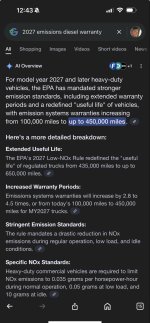Saddle Tramp
Moderator
I can tell by the comments on this video
Must be from all the running he took up.
Must be from all the running he took up.
I don't think people necessarily dislike diesel emissions stuff they just want them to work.For clarity, I've known Allen for about 5 or 6 years and this is about the 3rd or 4th time I've interviewed him. He has been a lobbyist and pushed hard for more diesel engine awareness for years. I used to get press releases about all the benefits of diesel over gas. There was a really interesting one where he countered the effects of the air quality in California during Covid. If you recall, the air quality was visibly much better during that period of time. Many diesel critics put the blame on those engines. I can't recall exactly what the press release said, but it made a compelling argument for diesel.
We talk off the record at times. He is really frustrated with the shitty job automakers did in rolling out diesel emissions systems and how that has created a legacy of people hating on them.
I think that's why they changed their name to the engine technology forum. I'd bet he just wanted to move on to other engine types. He shares some really interesting stuff on LinkedIn as well with regards to a variety of engines.
Why do I interview him? He is right in the thick of the regulation meetings with the various stakeholders on a variety of engine topics. He is a wealth of information as well with his nearly 30 years of experience.
Bingo, if the stuffed worked closed to flawlessly for a certain minimum amount of time like 150K miles, then it would be easier to plan for the cost of maintaining it in the future.I don't think people necessarily dislike diesel emissions stuff they just want them to work.
Yup, I made that exact statement in one of the emissions videos I did. Interestingly, the 2027 standards are supposed to increase the warranty on diesel emissions equipment. The people I've talked to are so negative towards the emissions systems, they frankly don't think it is possible for automakers to build the equipment to last through the warranty process.I don't think people necessarily dislike diesel emissions stuff they just want them to work.

Seems to be for heavy duty commercial trucks, not 2500/3500/F450 types of vehicles. I don't think the current warranty of 100K miles applies to us, only for heavy duty commercial.I can't look it up right now but what exactly does the EPA classify as a "Heavy Duty Vehicle" that would be affected by the new warranty? I think it's 8,500 GVW+ but they then break that category into different sections? I guess I'm wondering if 2500's & 3500's are going to be included or just more commercial fleet type vehicles?
Seems to be for heavy duty commercial trucks, not 2500/3500/F450 types of vehicles. I don't think the current warranty of 100K miles applies to us, only for heavy duty commercial.
That was a good question and something I hadn't thought about as to what specifically qualifies as a heavy-duty truck.I confirmed this, the new EPA warranty for 450k only applies to Class 8 which are Long haul semi trucks and large commercial vehicles. So much for any win for the traditional consumer. Even the 450 and 550 aren't in Class 8.
There’s the other side to it that if Semis can use emissions equipment that works for 450k miles, why can’t consumer diesel trucks do the same?It's an important distinction and one that I think is being used to manipulate a little frankly.
The average person even if you are a truck person thinks of light medium and heavy duty as half ton, 3/4 ton and one ton.
And on the front that is how the EPA defines them but they take that one ton or heavy duty category and split it up into multiple sections.
There’s the other side to it that if Semis can use emissions equipment that works for 450k miles, why can’t consumer diesel trucks do the same?
I think it goes back to the original idea that if the systems were reliable this would all be water under the bridge.Why would they?
